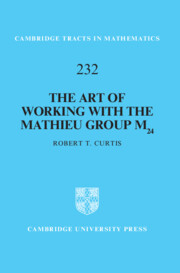Book contents
- Frontmatter
- Dedication
- Contents
- Figures
- Tables
- Preface
- Acknowledgements
- 1 Introduction
- 2 Steiner Systems
- 3 The Miracle Octad Generator
- 4 The Binary Golay Code
- 5 Uniqueness of the Steiner System S(5, 8, 24) and the Group M24
- 6 The Hexacode
- 7 Elements of the Mathieu Group M24
- 8 The Maximal Subgroups of M24
- 9 The Mathieu Group M24
- 10 The Leech Lattice M24
- 11 The Conway Group ·O
- 12 Permutation Actions of M24
- 13 Natural Generators of the Mathieu Groups
- 14 Symmetric Generation Using M24
- 15 The Thompson Chain of Subgroups of Co1
- Appendix MAGMA Code for 7★36 : A9 ↦ Co1
- References
- Index
12 - Permutation Actions of M24
Published online by Cambridge University Press: 31 October 2024
- Frontmatter
- Dedication
- Contents
- Figures
- Tables
- Preface
- Acknowledgements
- 1 Introduction
- 2 Steiner Systems
- 3 The Miracle Octad Generator
- 4 The Binary Golay Code
- 5 Uniqueness of the Steiner System S(5, 8, 24) and the Group M24
- 6 The Hexacode
- 7 Elements of the Mathieu Group M24
- 8 The Maximal Subgroups of M24
- 9 The Mathieu Group M24
- 10 The Leech Lattice M24
- 11 The Conway Group ·O
- 12 Permutation Actions of M24
- 13 Natural Generators of the Mathieu Groups
- 14 Symmetric Generation Using M24
- 15 The Thompson Chain of Subgroups of Co1
- Appendix MAGMA Code for 7★36 : A9 ↦ Co1
- References
- Index
Summary
The most combinatorially interesting maximal subgroups of M24 are the stabilizers of an octad, a duum, a sextet and a trio. In this chapter we investigate the way in which the stabilizer of one of these objects acts on the others. This involves some basic but fascinating character theory; the approach given here is intended to be self-contained. For each of the four types of object we draw a graph in which each member is joined to members of the shortest orbit of its stabilizer. Thus in the octad graph we join two octads if they are disjoint; we join two dua if they cut one another 8.4/4.8; we join two sextets if the tetrads of one cut the tetrads of the other (22.04)6; and we join two trios if they have an octad in common. A diagram of each of these four graphs is included as is the way in which these graphs decompose under the action of one of the other stabilizers. Each of these graphs is, of course, preserved by M24.
- Type
- Chapter
- Information
- The Art of Working with the Mathieu Group M24 , pp. 165 - 186Publisher: Cambridge University PressPrint publication year: 2024

